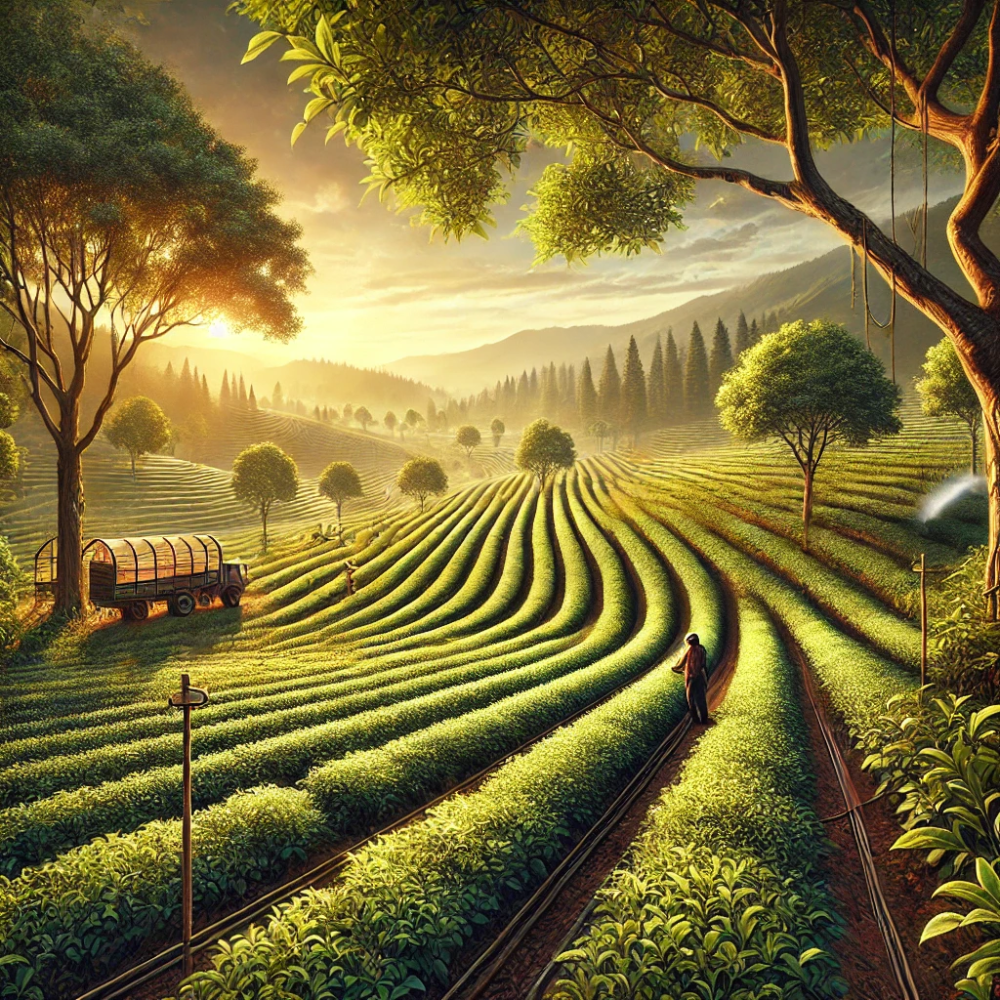Specialty tea cultivation is a highly sensitive agricultural activity that relies heavily on specific environmental and climatic conditions. With the increasing impact of global climate change, the tea industry faces significant challenges that threaten both the quality and sustainability of its production. This article explores how climate change affects specialty tea cultivation, the challenges farmers face, and sustainable solutions and innovations that help adapt to these changes.
1. Impact of Climate Change on Tea Cultivation
A. Rising Temperatures
- Effect on Growth: Higher temperatures accelerate tea plant growth, potentially reducing the concentration of aromatic compounds and affecting tea quality.
- Heat Stress: Plants may suffer from heat stress, increasing their susceptibility to diseases and pests.
B. Changes in Rainfall Patterns
- Drought: Insufficient rainfall leads to dry soil and a lack of moisture essential for tea growth.
- Flooding: Heavy rain and floods damage roots and cause soil erosion.
C. Extreme Weather Events
- Storms and Strong Winds: Cause mechanical damage to plants and reduce productivity.
- Frost: In high-altitude areas, sudden frost can damage leaves and buds.
2. Challenges Faced by Farmers
A. Decline in Productivity and Quality
- Flavor and Quality Changes: Climate changes affect the chemical composition of leaves, altering flavor and quality.
- Lower Yields: Unfavorable conditions reduce the quantity of harvestable leaves.
B. Increased Pests and Diseases
- Pest Proliferation: Higher temperatures and humidity create ideal conditions for pests.
- Emerging Diseases: New fungal and bacterial diseases may threaten crops.
C. Economic Challenges
- Higher Costs: Increased need for irrigation and pest control investments.
- Market Instability: Fluctuating production impacts pricing and revenue.
3. Sustainable Solutions and Innovations for Adaptation
A. Climate-Resilient Varieties
- New Varieties Development: Investment in research to develop drought- and heat-tolerant tea plants.
- Genetic Diversity: Preserving biodiversity to select suitable varieties for changing conditions.
B. Sustainable Farming Practices
- Climate-Smart Agriculture: Adopting practices that reduce carbon emissions and improve soil water retention.
- Water Management: Efficient irrigation systems like drip irrigation and rainwater harvesting.
C. Shade and Intercropping
- Tree Planting: Provides shade and reduces heat stress on tea plants.
- Intercropping: Growing other crops with tea enhances biodiversity and improves soil health.
D. Technology and Innovation
- Early Warning Systems: Use of technology to monitor weather and predict adverse conditions.
- Smart Apps: Providing farmers with guidance and information via mobile applications.
4. The Role of Consumers and Companies in Supporting Sustainability
A. Supporting Farmers
- Fair Trade: Choosing products that ensure fair prices for farmers.
- Eco-Certification: Looking for specialty teas certified by organizations that support sustainable practices.
B. Reducing Carbon Footprint
- Local Purchasing: Shorter transportation distances reduce emissions.
- Sustainable Packaging: Opting for biodegradable or recyclable packaging.
5. Examples of Successful Initiatives
A. “Climate Tea” Project in Kenya
- Description: A program training farmers in sustainable farming practices and cultivating drought-resistant varieties.
- Results: Increased productivity and improved tea quality with reduced environmental impact.
B. Organic Tea Farms in India
- Description: Some farmers have transitioned to organic farming, focusing on environmental diversity.
- Results: Healthier soil and plants, greater resilience to climate change.
Conclusion
The specialty tea industry faces significant challenges due to climate change. However, through collaboration among farmers, companies, and consumers, sustainable solutions can be developed to ensure the longevity of this cherished product. Innovations in agriculture, sustainable practices, and local community support are key to overcoming these challenges. As consumers, we can contribute to these efforts through conscious choices and support for sustainable products.
Also Discover:
- Specialty Tea: The Best Tasting Experience of Premium Tea
- The Concept of Specialty Tea: A Journey into Unique Flavors
- A Beginner’s Guide to the World of Specialty Tea
- A Detailed Analysis of Popular Specialty Tea Varieties
- Health and Wellness Benefits of Specialty Tea
- The Art of Preparing Specialty Tea: Techniques and Methods
- Specialty Tea and Cooking: Innovative Uses in the Kitchen
- Specialty Tea and Sustainability: Eco-Friendly Practices
- Modern Innovations in the World of Specialty Tea
- Specialty Tea and Global Cultures: Traditions and Rituals
- Specialty Tea as a Symbol of Art and Beauty
- Specialty Tea and Tourism: A Journey Through Global Tea Cultures
- Specialty Tea and E-Commerce: How the Internet is Changing Our Consumption
Special Feature: Discover the Distinction of Dilmah in the World of Specialty Tea
When discussing specialty tea and its superior quality, we cannot overlook the Dilmah brand, which has become a symbol of excellence in the tea world. Dilmah was founded by Merrill J. Fernando, who dedicated his life to bringing the finest teas from Sri Lanka to tea lovers around the world.
Why Dilmah?
- Unmatched Quality: Dilmah offers pure, sustainably grown tea, focusing on preserving the natural and authentic flavors of tea leaves.
- From Farm to Cup: Dilmah ensures every step of the production process is monitored, from growing the leaves to packaging, to provide an unforgettable tea experience.
- Commitment to Sustainability: Dilmah supports local communities and eco-friendly farming practices, making your choice of Dilmah tea a contribution to sustainable development.
The Dilmah Tea Experience:
Whether you're a fan of classic black tea or eager to explore new flavors of green and herbal teas, Dilmah offers a wide range to suit every taste. Join millions around the world who have made Dilmah tea a part of their daily routine and enjoy true excellence in every cup.
Choosing Dilmah Tea means choosing excellence, quality, and sustainability. Try it today and discover the difference for yourself!

